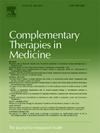Discovery of the microbiota-gut-brain axis mechanisms of acupuncture for amnestic mild cognitive impairment based on multi-omics analyses: A pilot study
IF 3.5
3区 医学
Q1 INTEGRATIVE & COMPLEMENTARY MEDICINE
引用次数: 0
Abstract
Objectives
Acupuncture is a promising therapy for amnestic mild cognitive impairment (aMCI). Growing evidence suggest that alterations in the microbiota-gut-brain (MGB) axis contribute to the development and progression of aMCI. However, little is known about whether and how acupuncture change the MGB axis of aMCI individuals.
Methods
This was a randomized, controlled, clinical trial. Forty patients with aMCI were randomly allocated to either the acupuncture group or the waitlist group. The primary outcome was the change in the Alzheimer’s Disease Assessment Scale-Cognitive Scale (ADAS-Cog) score. In addition, multi-omics was performed to detect changes in brain function, gut microbiota, and serum metabolites. Generalized estimating equations were used to estimate the outcomes, and correlational analyses were performed to explore the relationships between the clinical and multi-omics data.
Results
Compared to a mean baseline to week 12 change of –3.94 in the acupuncture group, the mean change in the waitlist group was 1.72 (net difference, –5.66 [95 % CI, –6.98 to –4.35]). Compared to the waitlist group, acupuncture’s MGB axis modulatory effect exhibited altered the regional homogeneity values of Frontal_Med_Orb_L, Cingulum_Mid_L, and Frontal_Sup_Medial_L, relative abundance of gut Ruminococcus_sp_AF43_11 and s_Eubacterium_coprostanoligenes, and levels of serum (11E,15Z)-9,10,13-trihydroxyoctadeca-11,15-dienoic acid, dipropylene glycol dimethyl ether, N6-Me-dA, and DPK, which correlated with changes in ADAS-Cog scores.
Conclusions
Our data imply that acupuncture ameliorates overall cognitive function, along with changes in brain activity, gut microbiota, and serum metabolites, providing preliminary evidence of the mechanisms acting through the MGB axis underlying the effects of acupuncture on aMCI.
基于多组学分析的针灸治疗遗忘性轻度认知障碍的微生物-肠-脑轴机制的发现:一项初步研究。
目的:针灸治疗遗忘性轻度认知障碍(aMCI)是一种很有前景的治疗方法。越来越多的证据表明,微生物-肠-脑(MGB)轴的改变有助于aMCI的发生和进展。然而,针灸是否以及如何改变aMCI个体的MGB轴知之甚少。方法:随机对照临床试验。40例aMCI患者被随机分配到针灸组和等候组。主要结果是阿尔茨海默病评估量表-认知量表(ADAS-Cog)评分的变化。此外,采用多组学方法检测脑功能、肠道微生物群和血清代谢物的变化。使用广义估计方程来估计结果,并进行相关分析以探索临床与多组学数据之间的关系。结果:与针灸组到第12周的平均基线变化-3.94相比,等候名单组的平均变化为1.72(净差为-5.66 [95% CI, -6.98至-4.35])。与等待组相比,针刺的MGB轴调节作用改变了Frontal_Med_Orb_L、Cingulum_Mid_L和Frontal_Sup_Medial_L的区域均匀性值,改变了肠道Ruminococcus_sp_AF43_11和s_eubacterium_coprostanoligene的相对丰富度,以及血清(11E,15Z)-9,10,13-三羟基八乙酸-11,15-二烯酸、二丙二醇二甲醚、N6-Me-dA和DPK水平,这些与ADAS-Cog评分的变化相关。结论:我们的数据表明,针灸改善了整体认知功能,以及大脑活动、肠道微生物群和血清代谢物的变化,为针灸对aMCI影响的MGB轴作用机制提供了初步证据。
本文章由计算机程序翻译,如有差异,请以英文原文为准。
求助全文
约1分钟内获得全文
求助全文
来源期刊

Complementary therapies in medicine
医学-全科医学与补充医学
CiteScore
8.60
自引率
2.80%
发文量
101
审稿时长
112 days
期刊介绍:
Complementary Therapies in Medicine is an international, peer-reviewed journal that has considerable appeal to anyone who seeks objective and critical information on complementary therapies or who wishes to deepen their understanding of these approaches. It will be of particular interest to healthcare practitioners including family practitioners, complementary therapists, nurses, and physiotherapists; to academics including social scientists and CAM researchers; to healthcare managers; and to patients. Complementary Therapies in Medicine aims to publish valid, relevant and rigorous research and serious discussion articles with the main purpose of improving healthcare.
 求助内容:
求助内容: 应助结果提醒方式:
应助结果提醒方式:


